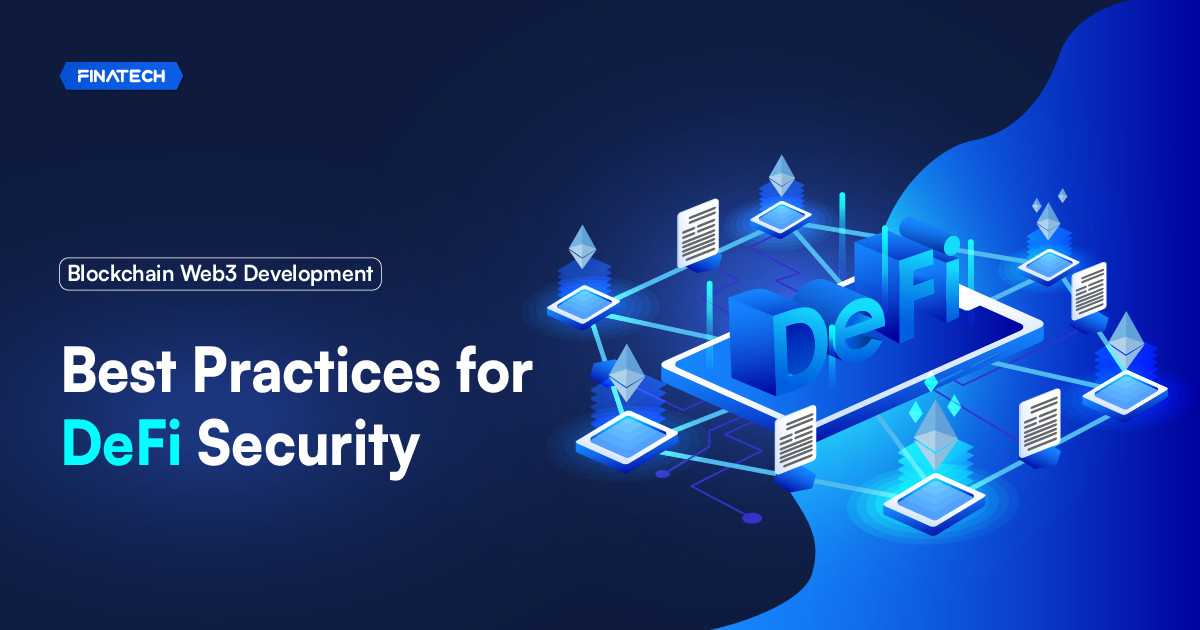Best Practices For DeFi Security
Blockchain Web3 Friday, June 9, 2023
Blockchain Web3 Friday, June 9, 2023

The development of decentralized finance (DeFi) protocols has brought significant advancements to the blockchain development. However, security remains a crucial concern for DeFi projects, especially before their launch to users. Emphasizing top DeFi security best practices is essential as these protocols handle users' finances, and ensuring their security improves trust and adoption.
Developers in the DeFi space often focus on resolving code issues to mitigate security vulnerabilities, but their results may be limited. It is crucial for developers to possess in-depth knowledge of popular DeFi security risks, such as brute force attacks, oracle attacks, and other threats.
The critical nature of risks in the DeFi domain is a clear reason to emphasize DeFi security. Here are some notable security risks that developers must consider in 2022:
DeFi security attacks can be as innovative as the applications in DeFi itself. Therefore, it is crucial to exercise caution and follow best practices to ensure the security of DeFi decentralized applications (dApps).
DeFi protocols face various vulnerabilities, highlighting the need for best practices to address security risks in this rapidly evolving landscape. The following practices can help mitigate DeFi security issues:
Protect against reentrancy attacks, a variant of the DAO hack, by updating the internal state of contracts before interacting with untrusted external contracts or transferring funds.
As blockchain systems lack a tamper-proof source of randomness, find a solution that offers a verifiable randomness oracle for generating secure random numbers.
Utilize automated testing tools, such as sample testing suites, to identify vulnerabilities. Employ static analysis tools to automatically analyze smart contracts and discover potential bugs.
Leverage function visibility and restriction in Solidity to authorize specific user groups for accessing functions, ensuring better contract management. However, be mindful of potential concerns about centralization in DeFi protocols.
Implement fair sequencing services, which order transactions based on temporal fairness, to prevent users from manipulating transactions in the mempool for personal gain.
Prioritize resolving common glitches in smart contract code, such as overflows, underflows, loops gas limits, and avoiding the use of "tx.origin." Ensure proper data management and accurate token transfer calculations.
Instead of relying on centralized oracles, opt for decentralized oracles to obtain accurate exchange rates and mitigate DeFi security exploits.
To effectively navigate the realm of DeFi security, it is crucial to proactively stay ahead of the curve by implementing updated monitoring systems and alert mechanisms that can detect and respond to emerging security risks and incidents. Additionally, the pursuit of robust DeFi security should encompass preparing smart contracts for the future by equipping them with dynamic sources of security intelligence.
To ensure robust DeFi security, it is crucial to include an external audit as one of the top best practices. This audit serves as a peer review, meticulously testing the code's security. Auditors thoroughly scrutinize each line of the codebase, providing a comprehensive evaluation to identify potential vulnerabilities.
A vital and practical aspect of addressing DeFi security vulnerabilities revolves around implementing a comprehensive disaster recovery plan. Several suggestions for such a plan include upgrade strategies and insurance coverage. Another effective solution involves incorporating an emergency "pause" feature.
As the DeFi ecosystem continues to grow and evolve, prioritizing security is of utmost importance. By following best practices such as conducting external audits, implementing multi-signature wallets, establishing a disaster recovery plan, and maintaining continuous monitoring and incident response capabilities, DeFi protocols can enhance their security posture.
Additionally, staying informed, educating users, and collaborating with security experts will contribute to a safer and more secure DeFi environment. By adopting a comprehensive approach to DeFi security, protocols can instill trust and confidence among users and drive the widespread adoption of decentralized finance.
Explore more articles here: